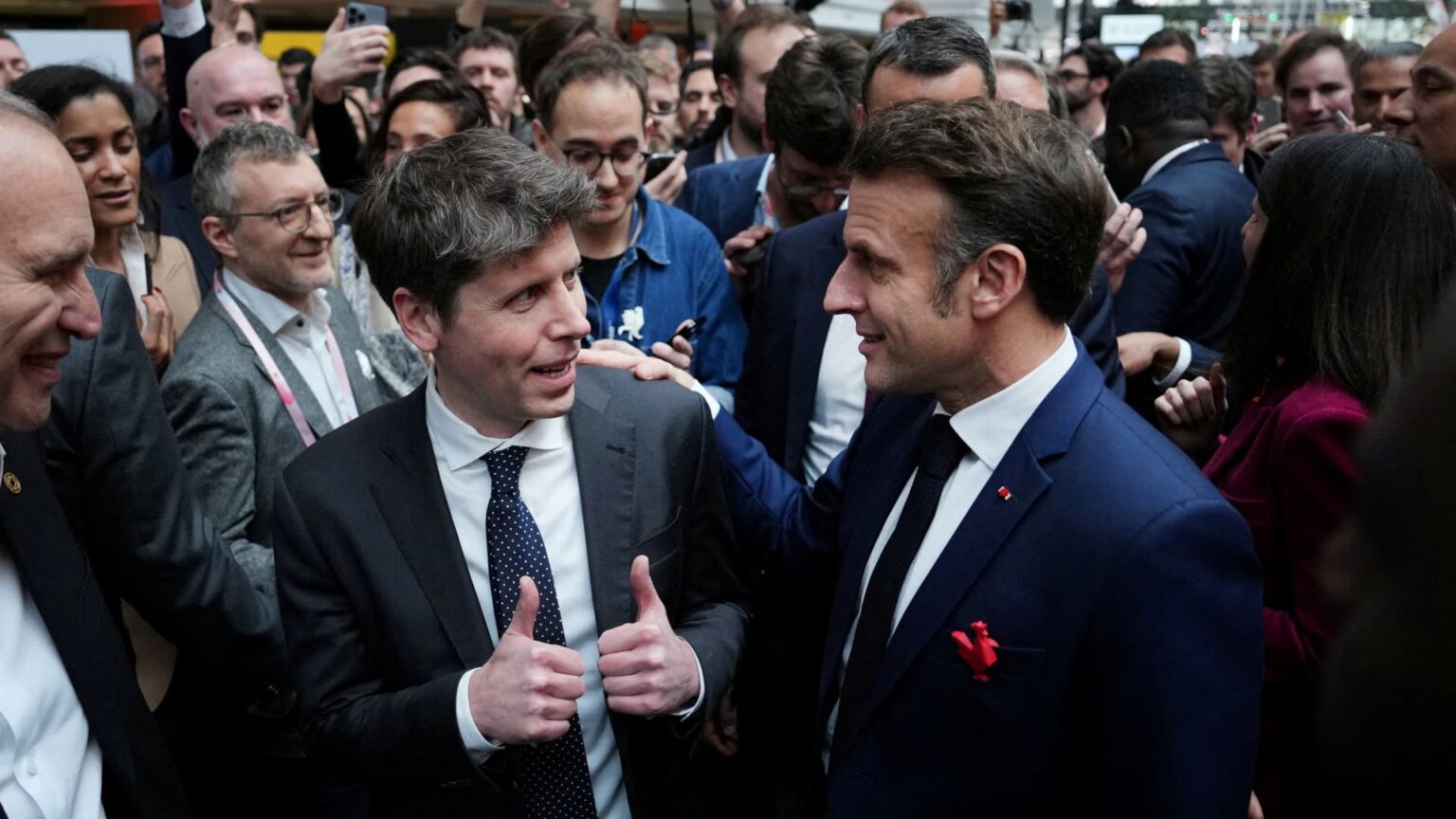Sam Altman, CEO of OpenAI, speaks with French President Emmanuel Macron at Station F, during an event on the sidelines of the Artificial Intelligence Action Summit in Paris, France, Feb. 11, 2025.
Aurelien Morissard | Via Reuters
PARIS — Music was blaring and people were cheering at the Artificial Intelligence Action Summit in Paris on Monday as French President Emmanuel Macron declared France is “back in the AI race.”
The bold call comes after Macron touted a 109 billion euro ($112.8 billion) investment in AI in the country. But it also underscores Europe’s desire, led by France, to be a part of the conversation around AI leadership and innovation that has so far been dominated by the U.S. and China.
Last month, America’s $500 billion Stargate announcement made headlines globally, followed by DeepSeek’s AI model, which sent shock waves across financial markets and highlighted China’s ability to keep apace with U.S. innovation.
Europe has long been seen by its critics as a place that has regulated the tech industry too heavily to the detriment of innovation.
Though that image has not entirely been changed, there are some in the technology industry who think Europe is moving in the right direction.
“As a European region, at least, we are starting to see global leaders emerge, and that’s the thing we really need,” Victor Riparbelli, CEO of AI video company Synthesia, told CNBC in an interview on Monday.

There are a number of key companies in Europe, ranging from self-driving technology startup Wayve in the U.K. to OpenAI rival Mistral in France.
“So I think it’s great that we invest more in infrastructure. I don’t think it’s the sole solution to the problem. … But what I think is really great is that there’s political will to actually do something,” Riparbelli added.
‘Fork in the road’
Last year, economist and politician Mario Draghi released a report that urged more investment in the European Union in order to boost competitiveness.
Draghi’s report noted that there are innovative ideas, but startups are “failing to translate innovation into commercialisation, and innovative companies that want to scale up in Europe are hindered at every stage by inconsistent and restrictive regulations.”
Chris Lehane, chief global affairs officer at OpenAI, told CNBC on Monday that based on his experience at the AI Action Summit, there is tension between Europe at the EU level and the countries within it.
“You can get this sense that there’s almost this fork in the road, maybe even a tension right now between a Europe at the EU level that is looking at a fairly significant, heavier regulatory approach. And then some of the countries, a France, a Germany, a UK, though not technically the EU, certainly European, they’re looking to maybe go in a little bit of a different direction that actually wants to embrace the innovation,” Lehane told CNBC.
He said that previous AI summits hosted by the U.K. and South Korea have focused on the safety around AI, but the Paris edition has a change of tone.
“I think this conference, you’re beginning to see maybe a different definition or consideration, that perhaps the bigger risk right now is missing out on the opportunity,” Lehane added.
Europe the ‘referee’
Still, the image of Europe as a burdensome place for tech regulation has not been shaken.
The EU’s AI Act was the first major law in the world governing artificial intelligence to go into effect in 2024. It has been criticized by companies as well as individual countries such as France which have said that the legislation could stifle innovation.
“One of the metaphors I sometimes use you look at AI as a World Cup football match between the U.S. and China. And if all Europe is trying to do is be the referee, there’s two problems. One, they never win, and two, no one really likes the referee,” Reid Hoffman, the co-founder of LinkedIn and an investor at venture capital firm Greylock, told CNBC on Monday.
Christel Heydemann, the CEO of telecommunications firm Orange, told CNBC in an interview on Tuesday that there is too much regulation in Europe.
“So that’s that’s slowing us down, especially when you think about the potential of the European market,” Heydemann said.
She did, however, strike an optimistic tone on Europe’s position on AI.
I don’t think, in the end, it’s a race between U.S. and China. Actually, the president of the European Commission has been very clear, Europe wants to be a continent of AI, and the race is not over yet,” Heydemann added.
https://www.cnbc.com/2025/02/12/europe-wants-to-be-part-of-ai-race-against-china-and-us.html


